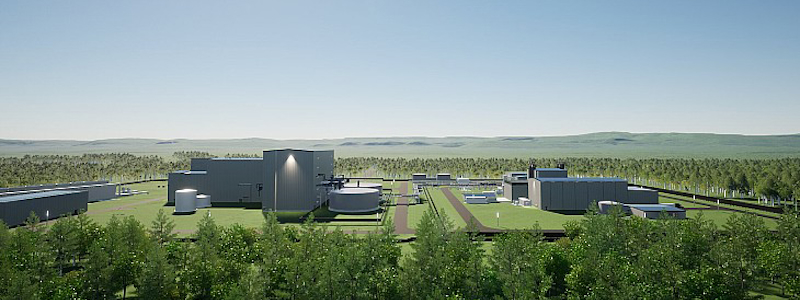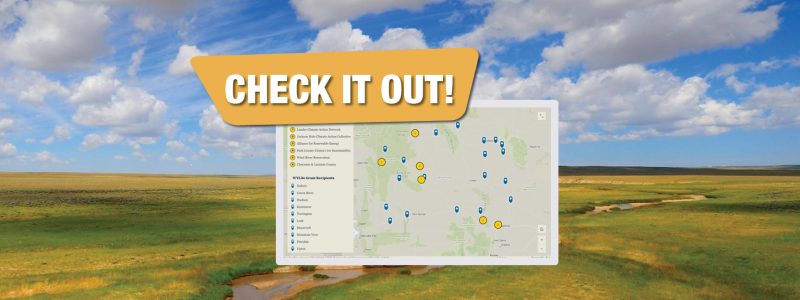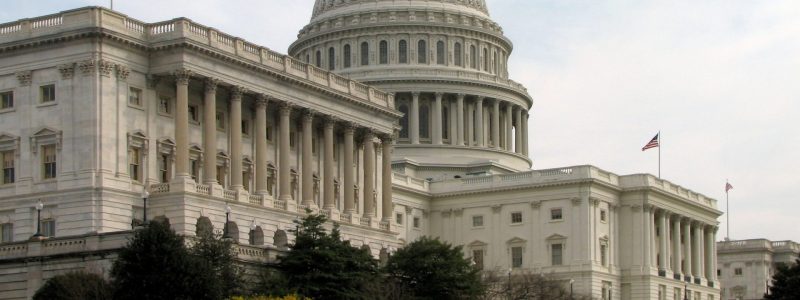
HERE IN WYOMING THE CLIMATE IS CHANGING, AND SO, TOO, ARE THE ENERGY POLICIES, MARKETS, AND ECONOMIC PRIORITIES AROUND US.
The only question that remains is this: What is Wyoming going to do about it?
Climate change
As one of our country’s top fossil fuel exporters, Wyoming has a huge greenhouse gas footprint. The Outdoor Council advocates for policies — like improved “leak detection and repair” of oil and gas facilities and increased emissions monitoring — that will reduce greenhouse gasses and harmful air pollutants that contribute to climate change and health impacts in our communities. Our best available scientific and economic analyses show us that climate change, and the global response to the threats it poses, will have real and tangible impacts on Wyoming’s environment, economy, and way of life. Unless we take the reins to ensure that the right policies are in place to reduce our emissions, expand the market for cleaner energy sources, and provide for a just and fair transition for Wyoming communities, market forces outside of our control will undermine the state’s traditional forms of revenue.
What we need now is leadership, and a path forward that leverages Wyoming’s unique resources and strengths to address the challenges and opportunities climate change presents. Here’s what we’re doing:
SUPPORTING STATEWIDE EFFORTS TOWARD ECONOMIC DIVERSIFICATION

The majority of Wyoming’s state budget — 55 to 65 percent — comes from taxes generated from the production of high carbon fuel sources like coal, natural gas, and oil. Diversifying these revenue sources and finding innovative ways to generate income in a carbon limited economy presents a major challenge that will require policy expertise at many levels. The Outdoor Council is working with stakeholders and policy makers to push these conversations and new ideas forward to emphasize Wyoming’s strengths, such as its outdoor recreation economy and the potential for appropriately sited renewable energy.
STANDING UP FOR CITIZEN SCIENCE IN WYOMING
The Outdoor Council recognizes how important, and sometimes fundamental, the data collected by citizens, academic research institutions, and other non-governmental groups can be in making regulatory decisions that protect our health and environmental quality — especially in a time of contracting budgets and limited agency resources.
For this reason in March 2020, WOC along with the US EPA protested the Wyoming Department of Environmental Quality’s proposed changes to impose strict requirements on who can collect water quality data used to support regulatory decisions. You can find our comments below.
The department’s new rules would hamstring the potential benefits of citizen science by requiring that regulatory determinations about water quality standards be made only by data collected by government entities or contractors. The new changes also limit data collection by including highly restrictive educational and training requirements.
We asked that the DEQ remove these arbitrary barriers to citizen science and instead focus on developing and communicating a clear process that maintains the ability of trained citizens to play a meaningful role in shaping water quality decisions in the state.
DOING RENEWABLES RIGHT
We believe that responsible renewable energy development will bring many opportunities to Wyoming and help us transition to a low carbon economy. However, all large energy projects have environmental impacts that must be carefully considered. As utilities and markets evolve to favor lower-cost renewable energy, the Outdoor Council is committed to being at the table with state and federal agencies to ensure Wyoming’s cherished wildlife and sensitive habitats are protected through proper siting and planning. We are leading the charge, working with the University of Wyoming, government officials, developers, and other stakeholders across the state to develop recommendations for responsibly siting and permitting the next generation of energy technologies.
FIGHTING FOR ROOFTOP SOLAR

At the small business, local government, and residential level, we are fighting to protect the state’s net metering policy so residents have access to affordable clean energy options right in their backyard. We are actively working with a coalition of conservation groups, small businesses, and local governments across the state to educate lawmakers about the benefits of rooftop solar and push back efforts to repeal net metering. To learn more about net metering, check out our infographic and other resources below.
GROWING GRASSROOTS CLIMATE ADVOCACY
Most Wyomingites believe in human-caused climate change, but how we talk about climate change, its challenges, and its solutions must also speak to Wyoming values and our unique context. The Outdoor Council is facilitating that conversation around climate change around the state by supporting grassroots initiatives like the Lander Climate Action Network and Citizens for Responsible Energy Development that empower citizens to take action.
aDVOCATING A JUST TRANSITION FOR ENERGY WORKERS & COMMUNITIES
Addressing climate change on Wyoming’s terms means growing the tent of traditional allies to build new partnerships with industry and labor groups to ensure that workers who have spent their careers in Wyoming’s energy industry are not left behind in the low carbon future. WOC is collaborating with labor and workers groups, like the Wyoming AFL-CIO and Utility Workers, in pursuing climate change policies through the lens of a “just transition” for energy workers and communities.
REDUCING WYOMING’S CARBON FOOTPRINT
As one of our country’s top fossil fuel exporters, Wyoming has a huge greenhouse gas footprint. The Outdoor Council advocates for policies — like improved “leak detection and repair” of oil and gas facilities and increased emissions monitoring — that will reduce greenhouse gasses and harmful air pollutants that contribute to climate change and health impacts in our communities.
THE LATEST FIELD NOTES, News & Action

-

RENAISSANCE MEETS REALITY
Will advanced nuclear technology usher in a clean energy utopia — or deepen existing problems? LATE ON A WEDNESDAY AFTERNOON in a nondescript conference room in Casper, the people filling rows of plastic chairs lean forward in their seats. Reporters lining the back wall raise cameras and audio recorders, straining to catch every word. The READ MORE >
-

A reason for hope: Check out our Community Climate Map!
Over the last several months we’ve seen the rollback of programs designed to help Wyoming communities adapt to a changing climate, reduce emissions, lower utility bills, and improve local infrastructure. We’ve also seen targets placed on renewable energy and the very science of climate change. This news has been difficult to stomach. But there’s reason READ MORE >
-

BIG AND BAD FOR WYOMING: HERE’S WHAT’S IN THE SENATE RECONCILIATION BILL
Update: The House of Representatives passed the budget bill and President Trump signed it into law on July 4. Late Tuesday morning the Senate narrowly passed its budget reconciliation bill in a 51–50 vote, with Vice President JD Vance breaking the tie. The bill is now back in the House, where representatives have to resolve READ MORE >
COMMENts, Letters, & Other Documents

Feb. 2021 | INFOGRAPHIC
What is net metering?
Dec. 2020 | LETTER
Lander Climate Action Network Recommendations for City Council
Dec. 2020 | ARTICLE, High Country News
Local Climate Efforts Cut Costs and Carbon in Wyoming
Nov. 2020 | REPORT
Wyoming Renewable Energy Siting Stakeholder Assessment
Nov. 2020 | PROCLAMATION
City of Lander Climate Proclamation
Oct. 2020 | COLLABORATIVE
Wyoming Renewable Energy Siting Collaborative Overview
Nov. 2019 | ARTICLE, Casper Star-Tribune
Bill to Overhaul Net Metering Fails After Massive Public Pushback
Sept. 2019 | ARTICLE, Wyofile
Bill Would KIll Residential Solar Critics Say
Sept. 2019 | PRESENTATION
Facts about net metering In Wyoming
